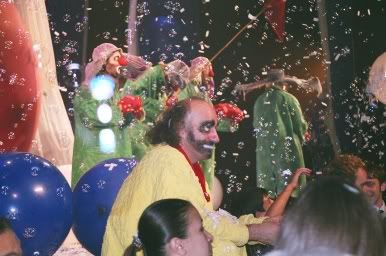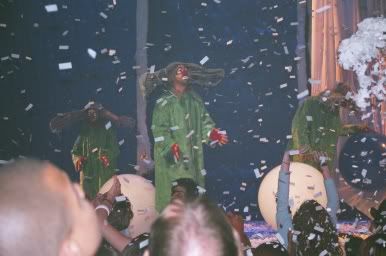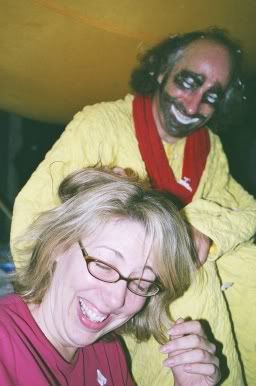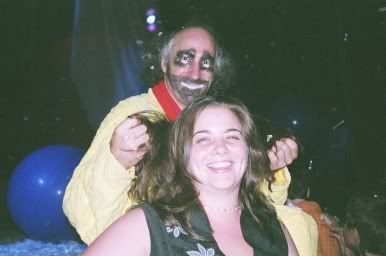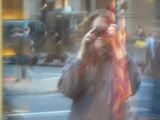This afternoon, I got a rather memorable phone call at work from a man interested in turning me on to Chabad, a very religious, orthodox subset of Judaism.
It was an amusing and interesting conversation. He was an amiable conversationalist, and although we disagree and I somewhat paraphrase our conversation below (he spoke a lot) to bring out the humor, I did enjoy the call, and it all was friendly and tongue-in-cheek for me.
Operation Interest Ruth in Chabad
Caller: Chabad Lubavitch is the most liberal of the Orthodox groups, you know.
Ruth: Hm. How interesting!
Caller: Judaism is based on the law, on the Truth. The great thing about Orthodoxy is that wherever you go, it's the same. It's like McDonalds that way.
Ruth: But without cheeseburgers.
Caller: Yes, without cheeseburgers.
Ruth: But if Chabad Lubavitch is the most liberal of the Orthodox groups, then it follows that Orthodoxy is not all the same.
***
Caller: Aren't you proud that both of your parents are Jewish?
Ruth: [pause] I'm proud of both of my parents as people.
Caller: [pause]
***
Caller: But what makes Judaism unique is that it's the Truth.
Ruth: I believe that Chabad Judaism is a true way of being Jewish. I also believe that other forms of exploring religion and spirituality are the truth. I don't believe in one truth. That concept turns me off. It's like the concept of having to go through Christ to reach God.
Caller: [unknown spluttered prayer] Why do you bring that up?!
***
Caller: Through mitzvot (good deeds) we bring holiness down.
Ruth: Is that the point in Chabad of doing good deeds?
Caller: Yes. God created us to have a home among us, that we should build holiness and the Messiah should come.
***
Caller: What do you believe is the difference between a Jew and a non-Jew?
Ruth: It depends on the Jew and the non-Jew.
***
Caller: Would you like to meet for coffee, maybe, sometime? At Starbucks?
Ruth: Don't get me wrong. I find Chabad very interesting. However, I also find it...
Caller: Even more interesting?
Ruth: (pause) Alien. And I would not join Chabad. It is not for me.
Caller: Well, then we can just meet and have a coffee.
Ruth: Let me be frank. You are not going to convert me.
Caller: Oh heavens no! You're Jewish, anyway! I couldn't convert you.
Ruth: You want to convert my practice and my belief.
Caller: What makes you think that??
Ruth: You talk more than you listen.
Caller: You've asked me questions. I would very much like to just be friends.
Ruth: I don't generally make a practice of making friends with people whose sole purpose in befriending me is to change me.
Caller: Well, maybe we can talk on the phone sometime.
Ruth: That would be lovely.
Caller: And you know, sometimes my wife and I have people over for Shabbos dinner. And people who aren't religious come...you might meet a nice young man!
Ruth: Laughs.
***
So, you can see his persistence. I have to say, I admire his ability to keep trying to welcome me in despite my candor. He was more interested in expounding his philosophy than having a discussion, of course, and the one-liners on my side were more a matter of need than of any usual brevity of speech (as anyone who knows me is aware).
I have no ill-will toward him, although there are definitely major points of disagreement that I have with his philosophies, of course. As I do with the orthodoxies within all the three religions of the Book, so to speak.
One thing he said gave me pause. I'm used to thinking of myself as "the Other" in the eyes of the Chabad and ultra-Orthodox. Usually, I imagine that they see me either as a wayward Jew or as undistinguishable from the general population (Christian).
But he had found my name through a newspaper article about a workshop I'd done on some recent research by my organization. He said that he found it interesting to read about the work of Jewish professionals outside the Orthodox world, who were looking into why Jews are not connected to synagogues and Jewish life, nor committed to marrying other Jews.
Can I explain why I find that interesting? I don't know. I guess because it's the closest to possible (?) validation that Jews of all stripes are Jews, and that you don't have to be like them to be an important and functioning part of the whole. Of course, maybe that's not what he meant. I guess I was just surprised that our work isn't completely ignored and considered irrelevant to them.
Which brings me to the realization that I have no idea what "they" think at all. That I am working on assumptions. I would like to talk about that with the Chabad guy. But would he talk about it with me, or would he be too heavy in convert-Ruth-to-Chabad-ways thoughts to really exchange opinions on that matter?
Maybe there's only one way of knowing. Let's see if he calls.
There's a Jewish philosophy which I understand Chabad keeps: "If you save one person, it is as if you had saved the world." Of course, they would view that as redemption or inclusion in helping to "bring holiness down" to earth. I wonder if he'll continue his efforts to save the world by "saving" me.
Time will tell. :)
